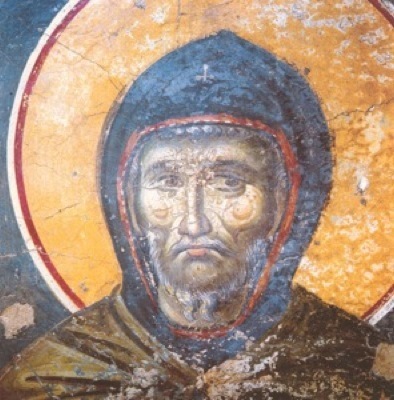
Ci-dessous est publié le texte de la conférence prononcée par le père Stephen Headley au colloque sur la Beauté chez les Pères, organisé en novembre 2011 à l'Institut catholique de Paris:
This Syriac Christian (303-373) was both a deacon and a poet. Ephrem was truly a Semitic bard using the Aramaic dialect of the ancient city of Edessa (the modern Urkay). He composed more than four hundred hymns, songs (madrâshé) in a dozen thematic cycles using some fifty syllabic stanza patterns. Ephrem grew up in Nisibis, lying between the Tigris and the Euprates, which he was forced to leave when in his late fifties it was ceded to the Persians after the death and defeat of the Roman emperor Julian the Apostate’s army in 363. Ephrem and his fellow Syraic Christians then fled to Edessa some one hundred and fifty km. to the west (see map in finé). In prose Ephrem wrote polemical works and in rythmed prose commentaries on the Bible. In poetry he wrote versified homilies (memré in 7+7 syllables) as well as the madrâshé examined below. We will briefly examine his ascetical theology: his experience of beauty; the putting on of the robe of glory; the heart as a nuptial chamber and the depths of silence as prayer.
The experience of Beauty in the poetry of St Ephrem:
His purely Semitic mindset was structured neither by the Neo-Platonic opposition of form and matter, and of course by the much later epitomological opposition of subject and object. For Ephrem poetry, when sung on the lyre of the Spirit, permitted an experience of participation. For Ephrem the Christian’s experience of beauty is that of light and brilliance of God’s truth. In this respect Ephrem was in direct continuity with the ethos of the Psalter. In psalm 26:8 we read,”Lord I love the beauty of your house and the place of your glory dwells.” And in psalm 50:2 : “God shines forth out of Sion, more beautiful than all.”
But where does the beauty of God shines forth? The image in which man was created reflects deepest mystery, hidden in the foundation of his soul: (Genesis 1:26) answers this question: “And God said, ‘Let us make man in our image after our likeness…’ So the grace of His Spirit shines inside a man invisibly, without any objective dimension, nonetheless revealing to him the unsurpassed beauty of his creator. This is only possible if the mirror of the soul is polished through reprentence to a high gloss While this experience is certainly an ascetic one, requiring purity and humility, it becomes an aesthetic or spiritual one. In Hebrew, the word glory (kubôd) designates both the “weight” and the beauty of holiness. God’s cosmos, his creation, also articulates an order of beauty that returns to the light and life that infused it. And ultimately, finally, the finest of God’s creatures, man, whose nature is assumed by Christ, becomes the true sanctuary (Rom 3:25; I John 2:2; 4:10)
Pour lire le reste, merci de télécharger le document ci-joint, en PDF.
This Syriac Christian (303-373) was both a deacon and a poet. Ephrem was truly a Semitic bard using the Aramaic dialect of the ancient city of Edessa (the modern Urkay). He composed more than four hundred hymns, songs (madrâshé) in a dozen thematic cycles using some fifty syllabic stanza patterns. Ephrem grew up in Nisibis, lying between the Tigris and the Euprates, which he was forced to leave when in his late fifties it was ceded to the Persians after the death and defeat of the Roman emperor Julian the Apostate’s army in 363. Ephrem and his fellow Syraic Christians then fled to Edessa some one hundred and fifty km. to the west (see map in finé). In prose Ephrem wrote polemical works and in rythmed prose commentaries on the Bible. In poetry he wrote versified homilies (memré in 7+7 syllables) as well as the madrâshé examined below. We will briefly examine his ascetical theology: his experience of beauty; the putting on of the robe of glory; the heart as a nuptial chamber and the depths of silence as prayer.
The experience of Beauty in the poetry of St Ephrem:
His purely Semitic mindset was structured neither by the Neo-Platonic opposition of form and matter, and of course by the much later epitomological opposition of subject and object. For Ephrem poetry, when sung on the lyre of the Spirit, permitted an experience of participation. For Ephrem the Christian’s experience of beauty is that of light and brilliance of God’s truth. In this respect Ephrem was in direct continuity with the ethos of the Psalter. In psalm 26:8 we read,”Lord I love the beauty of your house and the place of your glory dwells.” And in psalm 50:2 : “God shines forth out of Sion, more beautiful than all.”
But where does the beauty of God shines forth? The image in which man was created reflects deepest mystery, hidden in the foundation of his soul: (Genesis 1:26) answers this question: “And God said, ‘Let us make man in our image after our likeness…’ So the grace of His Spirit shines inside a man invisibly, without any objective dimension, nonetheless revealing to him the unsurpassed beauty of his creator. This is only possible if the mirror of the soul is polished through reprentence to a high gloss While this experience is certainly an ascetic one, requiring purity and humility, it becomes an aesthetic or spiritual one. In Hebrew, the word glory (kubôd) designates both the “weight” and the beauty of holiness. God’s cosmos, his creation, also articulates an order of beauty that returns to the light and life that infused it. And ultimately, finally, the finest of God’s creatures, man, whose nature is assumed by Christ, becomes the true sanctuary (Rom 3:25; I John 2:2; 4:10)
Pour lire le reste, merci de télécharger le document ci-joint, en PDF.
 Accueil
Accueil Envoyer à un ami
Envoyer à un ami Version imprimable
Version imprimable